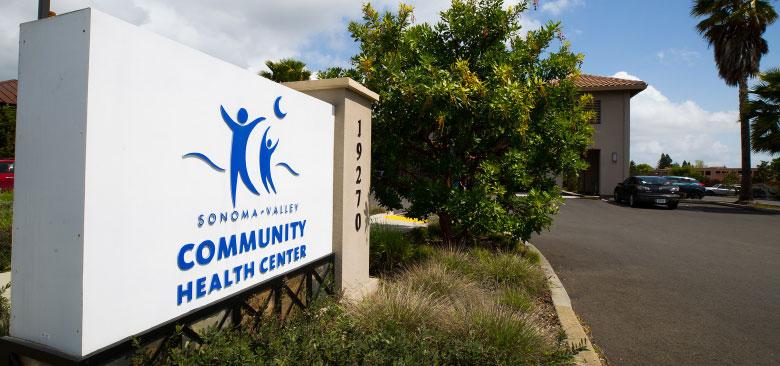
Sonoma Valley Community Health Center
North Coast Fires Spark a Mental Health Crisis; UCSF Responds
When wildfires tore through Sonoma County in the fall of 2017, UC San Francisco School of Nursing faculty member Rosalind De Lisser worried that the effects on the mental health of the area’s residents could be immediate and lasting. Working with fellow faculty members Katelyn Brady and Kimberly Baltzell – the latter a member of UCSF’s Global Disaster Assistance Committee – De Lisser mobilized a group of licensed psychiatric providers from UCSF to help address the crisis.
“Many of us who work in mental health understood the fires’ likely impact – not just acute stress, but also PTSD [post-traumatic stress disorder] down the road,” she says.
De Lisser had been working collaboratively with the Sonoma Valley Community Health Center (SVCHC) for more than two years, and in December 2017, Brady stepped in to help UCSF and the SVCHC work out an arrangement that continues to this day: Every Saturday, UCSF volunteers, under the scope of their license, provide free, drop-in individual and group crisis counseling to all members of the Sonoma Valley community, with or without insurance or documentation.
“Word has spread, and though we originally planned to end the program in March, we’ve been asked to continue longer,” says Brady.
Helping Those in Need
Having grown up in Petaluma and with family still in the area, Erica Castro was the first UCSF volunteer provider at the SVCHC.
“When Rosalind reached out to us, it seemed like a perfect way to benefit the community with my skill set,” says Castro, who graduated from the School’s Psychiatric/Mental Health Nurse Practitioner (PMHNP) program in June 2017 and is currently completing a PMHNP residency at the San Francisco VA Health Care System (SFVAHCS). “I wanted to be part of something long-term and tangible.”
Cedric Thurman, who is also doing a PMHNP residency at the SFVAHCS, also felt motivated by a desire to give back. Originally from Georgia, Thurman joined the military right out of high school and says it offered him opportunities that he knew others he’d grown up with would never have.
“I know from experience that a helping hand goes a mile,” he says. In his two days at the SVCHC, he worked mostly with patients approaching retirement age who had suddenly lost everything. “There was a lot of social distress. During what was really an intake interview, I was able to apply some theoretical therapeutic ideas: cognitive behavioral therapy, motivational interviewing, supportive therapy,” he says.
Brady describes working with a parent and child who lost family members and their home in the fires. They were living in a motel and searching for more permanent housing, but the child had been struggling with grades and social isolation. Brady offered some brief crisis counseling that normalized and validated the family’s challenges, taught them coping strategies for when they felt overwhelmed or were experiencing flashbacks and connected them to more long-term mental health services with the help of the SVCHC’s psychosocial support team and primary care providers.
“The clinic is a great opportunity for people who wouldn’t know where and how to access mental health care or who might not realize they’re dealing with symptoms of trauma,” says Castro. “I hope people find it helpful.”
An Ongoing Clinical Rotation
Since mid-April, the volunteers have changed somewhat. “Originally, this was mostly advanced practice NPs, largely from faculty,” says De Lisser. “But we’ve now developed a teaching agreement with the clinic where our weekly volunteers are first- and second-year students [from the PMHNP program], who can also use this as a clinical learning opportunity.… They are all RNs, and it’s well within their scope of practice to provide crisis counseling.”
 Katelyn Brady “The students have been in clinicals all year,” says Brady. “This is a prime place to refine their skills.”
Katelyn Brady “The students have been in clinicals all year,” says Brady. “This is a prime place to refine their skills.”
De Lisser precepts the students before and after each visit. She and the students discuss a framework for how to approach a brief intervention during which, she says, “We make sure that patients are safe and getting their needs met. This includes coordinating with psychosocial support services at the clinic. And if something comes up during a session, they have my support or can get the clinic’s psychosocial support team involved.”
“We are grateful for the partnership with UCSF to provide counseling to our community in a time of crisis,” says Kathryn Nevard, the SVCHC’s development director. “We definitely want it to continue because this is going to be a long process for many people dealing with the aftermath of these fires, and the volunteers have really helped Sonoma Valley receive better care.”
A Potential Ongoing Partnership
“[The volunteer effort] has really emphasized the clinic’s stated need for a provider role that could be filled by a PMHNP,” says De Lisser, who has been in discussions about creating a UCSF PMHNP faculty practice at the SVCHC. Students from the School recently completed a needs assessment and found a provider gap for community-based mental health services, and the clinic has been actively advertising for a psychiatric provider.
“Being in a rural location can make it difficult to get providers, so a partnership with UCSF to start filling some of these gaps would be a real help,” says Nevard.
De Lisser and Brady believe a PMHNP faculty practice offers a variety of advantages. PMHNPs can see patients for group therapy, individual therapy and in-depth assessment, evaluation and medication management, but also engage with community organizations and provide education.
“We love that this could be community-based – an opportunity to augment the SVCHC’s services – as well as a great opportunity to engage our students, many of whom speak Spanish and want a rural health focus, the chance to work with that population,” says De Lisser. “Now – after our experience up here and many stakeholder meetings – we are hopefully closer to making a [long-term] collaboration real.”



